Papers by Kyriaki Messiou
Voces de la educación, 2018
This paper argues for the need to engage with the views of children in primary schools as a way o... more This paper argues for the need to engage with the views of children in primary schools as a way of promoting inclusive education. One example from one primary school, where the views of children were explored in order to develop further the school’s practices, will be used to illustrate this argument. Methodological considerations, the benefits as well as the challenges associated with the process will be discussed.
This paper focuses on the importance of engaging with students' voices in order to understand... more This paper focuses on the importance of engaging with students' voices in order to understand and address marginalisation in schools. Using illustrative examples from research conducted in schools, the aim is to demonstrate how through the use of a framework, issues related to marginalisation can be addressed in schools and, in so doing, facilitate inclusion. The process of using the framework will be described and the paper will conclude with a discussion about how marginalisation can be addressed in schools from three perspectives: first, by taking specific actions regarding individual students, or in relation to issues that create barriers to student participation; secondly, by engaging with all students' voices; and thirdly, by focusing on the involvement of 'forgotten groups of learners' in the process of data collection and analysis.
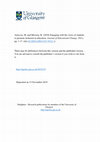
The argument developed in this paper is set within the context of an increasing global concern to... more The argument developed in this paper is set within the context of an increasing global concern to promote inclusion in education. Drawing on the authors’ research over many years, it argues that an engagement with the views of students can lead to changes in understandings and practices that help to facilitate the development of more inclusive approaches in schools. At the same time, these experiences show how such processes can lead to ‘interruptions’ in the work of those in schools in ways that may challenge the status quo and sometimes lead to negative reactions. It is argued, however, that, under appropriate organisational conditions, such approaches can lead to dialogue between students and teachers that stimulates actions to promote inclusion in education. The paper concludes by outlining how such conditions can be promoted, focusing in particular on issues related to cultures and leadership.
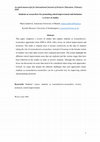
International Journal of Inclusive Education, 2020
This paper comprises a review of studies that employ students as researchers/coresearchers approa... more This paper comprises a review of studies that employ students as researchers/coresearchers approaches from 2000 to 2018, with a focus on school improvement and inclusion. The study is original since it focuses exclusively on the idea of students taking the role of researchers/co-researchers, instead of focusing on the broader notion of student voice that other reviews have explored previously. The results highlight the different school improvement areas that are explored and the various stages that have been followed in the studies in order to involve students. Through this analysis, we focus our discussion on issues that need to be considered when using such approaches. Overall, we argue that despite the inherent challenges that such approaches entail, students as researchers/co-researchers can be a powerful way for improving schools and promoting inclusion.

British Educational Research Journal, 2020
This paper traces the development of Inclusive Inquiry, a new approach to the promotion of inclus... more This paper traces the development of Inclusive Inquiry, a new approach to the promotion of inclusion in schools. It explains how this builds on a programme of research carried out by the authors over a period of 20 years. Central to the approach is dialogue amongst teachers and their students about how to make lessons more inclusive. This involves children becoming researchers who learn how to use research techniques to gather the views of their classmates, as well as observing lessons. The approach was refined as a result of a three-year action research study carried out with a network of eight secondary schools, in three European countries. It was then trialed in 30 primary schools, in five European countries. In each country a team of university researchers supported, recorded and analysed the action research as it occurred, using observations, interviews and surveys. The paper provides an analysis of the impact on the thinking and practices of teachers, and on the attitudes and engagement of students in learning. It is argued that Inclusive Inquiry is an approach that facilitates dialogues that can lead to transformations of practices and thinking, and the development of inclusive schools. Some of the challenges involved in using the approach in schools are identified.
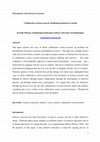
Educational Action Research, 2018
This paper explores the ways in which collaborative action research can facilitate the developmen... more This paper explores the ways in which collaborative action research can facilitate the development of inclusive practices and thinking in schools. The paper uses examples from a study that involved three countries and eight secondary schools to illustrate how the process of collaborative action research promoted inclusive thinking and practices. The study combined a well-established approach of professional development-lesson study-and a framework for engaging with the views of students. This led to a distinctive model of teacher professional development that has at its core the idea of engaging with the views of students. Thematic analysis of data collected from all the settings over three years, highlighted three ways in which collaborative action research led to the promotion of inclusive practices and thinking in schools: through teacher collaboration; through the development of reflective practice; and through student active participation. It is argued that what was distinctive through the process was the fact that collaboration occurred between adults and students, something that is less evident in the collaborative action research literature. Through this process inclusive thinking and practices were developed.
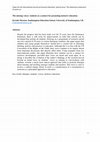
International Journal of Inclusive Education, 2019
Despite the progress that has been made over the 25 years since the Salamanca Statement, there is... more Despite the progress that has been made over the 25 years since the Salamanca Statement, there is still room for improvements in order that schools can be developed that include all students. Drawing on a programme of research carried out over a period of 20 years in various European countries, this paper argues that children and young people themselves should have a central role in informing thinking, policies and practices in education. Although this is in line with the UN Convention of the Rights of the Child, their views continue to be largely absent from important discussions that directly affect them. Using examples from two interconnected studies, this paper illustrates how students can be a catalyst for inclusive development, provided their views are heard and acted upon. In so doing, it describes the evolution of the author's thinking, as the research moved beyond an initial focus on students' voices as relating to conversations with students, towards a much more radical approach that seeks to promote dialogue about learning and teaching amongst students and teachers. This move is seen to involve a cultural change which, in itself, is a manifestation of a commitment to inclusion as a principled approach to education.
Educational Review, 2017
This paper examines how marginalisation of students in schools can be understood and addressed. U... more This paper examines how marginalisation of students in schools can be understood and addressed. Usually the term marginalisation is associated with existing categories, which mostly relate to policy formulations, and shape teachers' expectations of these groups as well as their practices. Using examples from the author's research, it is argued that a focus on the views of students can facilitate an understanding of marginalisation, as a broader concept that might be experienced by any student in school. In addition, the paper proposes an alternative approach, one that involves dialogue with students in order to challenge thinking that associates marginalisation with existing categories. Illustrative examples are used to demonstrate how such thinking can ensure the development of more inclusive thinking and practices that take account of all students.
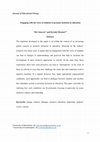
Journal of Educational Change, 2017
The argument developed in this paper is set within the context of an increasing global concern to... more The argument developed in this paper is set within the context of an increasing global concern to promote inclusion in education. Drawing on the authors' research over many years, it argues that an engagement with the views of students can lead to changes in understandings and practices that help to facilitate the development of more inclusive approaches in schools. At the same time, these experiences show how such processes can lead to 'interruptions' in the work of those in schools in ways that may challenge the status quo and sometimes lead to negative reactions. It is argued, however, that, under appropriate organisational conditions, such approaches can lead to dialogue between students and teachers that stimulates actions to promote inclusion in education. The paper concludes by outlining how such conditions can be promoted, focusing in particular on issues related to cultures and leadership.
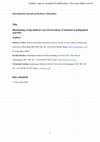
International Journal of Inclusive Education, 2019
This paper presents findings from a research study, which sought to illuminate the perceived noti... more This paper presents findings from a research study, which sought to illuminate the perceived notions of inclusion of four to five year old children in pedagogical activities, in the early years classes of two schools in the North of England. It employed a qualitative methodology to gather extensive data with forty children over a six-week period in each school. This included collecting fieldnotes; undertaking observations of children in pedagogical activities; and conducting group and individual interviews. Central to the research aim was the use of participative tools to engage with children's voices; these included photographs and drawings. Children's perceived notions of inclusion resonated with two dimensions: belonging and relationships (with practitioner and/or child) and democratic pedagogies. The findings advance the conceptualisation of the notion of inclusion and bring to the fore the voices of a young group of children that has not been studied before. Engaging with children in meaningful ways can enable practitioners to better understand young children's perceived, multi-faceted notions of inclusion as they experience it within pedagogical activities.
Introduction: Bus journeys 1. Conceptualising marginalisation 2. Using the framework 3. Opening d... more Introduction: Bus journeys 1. Conceptualising marginalisation 2. Using the framework 3. Opening doors: Enabling voices to emerge 4. Looking closely: Bringing concerns to the surface 5. Making sense of the evidence: Sharing data with learners 6. Dealing with marginalisation: Encouraging inclusive thinking and practice 7. Engaging with students' voices: An approach to inclusive education Conclusion: Collaborative journeys
International Journal of Inclusive Education, 2017

International Journal of Inclusive Education, 2016
This paper sets out to challenge thinking and practice amongst researchers in the field of inclus... more This paper sets out to challenge thinking and practice amongst researchers in the field of inclusive education. It does this based on an analysis of published articles in the International Journal of Inclusive Education between 2005-2015, which identified topics and methodologies used in studies of inclusive education. The analysis highlights the fact that most of the studies are only concerned with certain groups of learners and that a limited number make use of collaborative, transformative approaches. It is argued that focusing only on some students, rather than on all, is contrary to the principles of inclusive education. At the same time, given the emphasis of inclusion on enabling the participation for all students, it is argued that more research needs to adopt collaborative approaches that set out to change thinking and practice in the field. Illustrative examples from articles that used such approaches are discussed to highlight their potential benefits.
School Effectiveness and School Improvement, 2016
Drawing on evidence gathered as a result of collaborative action research carried out in eight se... more Drawing on evidence gathered as a result of collaborative action research carried out in eight secondary schools in three European countries, this paper proposes an innovative strategy for helping teachers respond positively to learner diversity. The strategy merges the idea of lesson study with an emphasis on listening to the views of students. The research suggests that it is this latter emphasis that makes the difference as far as responding to learner diversity is concerned. It is this that brings a critical edge to the process that has the potential to challenge teachers to go beyond the sharing of existing practices in order to invent new possibilities for engaging students in their lessons. The paper also considers some of the difficulties involved in using this strategy.
Teaching and Teacher Education, 2015
Increasing diversity in schools means that teachers need more effective forms of professional dev... more Increasing diversity in schools means that teachers need more effective forms of professional development to address the challenges they face. Drawing on findings from a three-year study in three European countries, this paper presents a new way of thinking about what this should involve. What differentiates the proposed model is that it emphasises the views of students themselves, something that has previously been largely absent from teacher professional development literature. Through the use of illustrative examples, the paper shows how this factor can act as a catalyst for the development of new thinking and practices in response to learner differences.
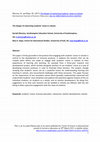
International Journal of Inclusive Education, 2015
This paper is firmly grounded in the position that engaging with students' voices in schools is c... more This paper is firmly grounded in the position that engaging with students' voices in schools is central to the development of inclusive practices. It explores the tensions that can be created when efforts are made to engage with students' voices in relation to their experiences of learning and teaching. An example from a three-year research and development project, which worked alongside teachers to use students' voices as a way of developing inclusive practices, is used to illustrate these tensions. This project, though showing that students' voices can be a powerful means for understanding learning and teaching in schools, also encountered challenges with these processes. This paper focuses on the experiences of one secondary school which (possibly inadvertently) subverted and undermined students' voice initiatives and explores the potential negative impacts of this on individual students, on students as a whole, and on teacher development. By doing this, suggestions as to how such tensions can be avoided in schools are offered, with the aim being to allow a genuine engagement with the views of students.
International Journal of Research & Method in Education, 2014
... How to Hear and to Heed the Student Voice Fiona Campbell 22. Trust, Contextual Sensitivity an... more ... How to Hear and to Heed the Student Voice Fiona Campbell 22. Trust, Contextual Sensitivity and Student Voice Gerry Czerniawski and Su Garlick 23. Research Methods for Pupil Engagement: Hearing Student Voice Joanne Waterhouse 24. ...











Uploads
Papers by Kyriaki Messiou